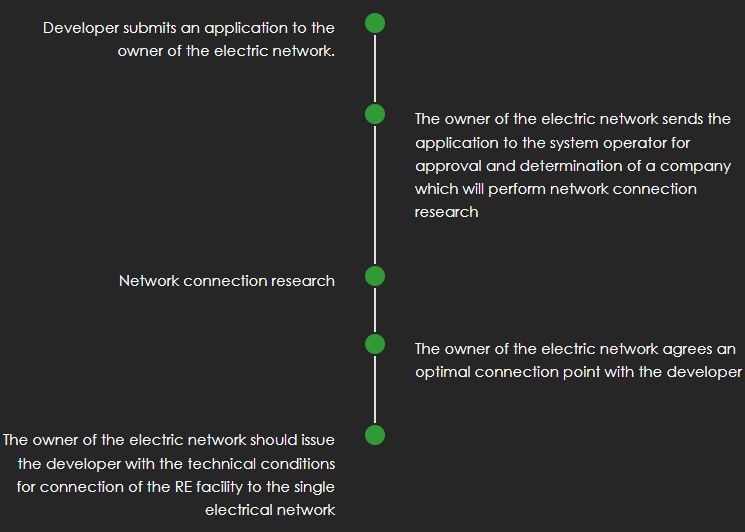- with readers working within the Retail & Leisure industries
- within Finance and Banking, Tax and Corporate/Commercial Law topic(s)
Implementation of Renewable Energy Projects in Uzbekistan
GENERAL INFORMATION
Legislation
The implementation of RE projects in Uzbekistan is regulated by the Law on use of Renewable Energy sources which entered into force on 22 May 2019. It is the first statute that provides comprehensive regulation of the sector of RE in Uzbekistan. Uzbek Renewable Energy law covers not only generation of electricity from renewable energy, but also the production of the equiment that generates such energy. Under the RE law the renewable energy sources are defined energy of solar, wind, geothermal, hydrothermal, hydropower, biomass, which are naturally renewed in the environment.
PPA
PPA is a contractual agreement between a guaranteed energy buyer and an alternative energy power generator (a seller). The required conditions to make a PPA effective:
- The required conditions to make a PPA effective:
- Comprehensible text (concept, terminology);
- Fair allocation of risks between the Parties;
- Predictability of key elements (fees, liability of the parties, etc.)
- Procedures and instruments to address problems (non-performance of obligations, compensations, force-majeur, etc.)
As of today, there is no standard form of power purchase agreement (PPA). However, it is expected that the PPA is to be drafted and approved by the Ministry of Energy in the near future.
The main institutions acting in the Republic of Uzbekistan in the sphere of RE projects:
- Ministry of Economy
Responsible for development programs on modernization of sectors, and introduction of advanced and resource-saving technologies;
- Ministry of Finance
regulates and sets tariffs;
- Cabinet of Ministers
Coordinates country's energy policy;
- Uzbekenergo
Vertically integrated and state electricity company owning over 97 percent of the country's generating capacity, responsible for distribution and transmission;
- UZINFOINVEST
Investment agency responsible for consulting and attracting foreign investors;
- Ministry of Agriculture and Water Resources
manages the Uzsuvenergo company, responsible for the operation of the small hydropower plants in the country.
The opportunities to finance a RE project in Uzbekistan:
Tax incentives
EBRD |
IFC |
ADB |
Tariffs
Tariffs for electricity generated from renewables will be determined based on a competitive bidding process. All costs for purchasing electricity, including electricity from renewable energy sources, will be taken into account while setting the tariffs for end consumers.
New Tax Code, adopted in December 30,2019 provides following tax incentives for RE projects:
- RenPower producers exempt from Property Law and Tax on RenPower facilities for 10 years from commissioning (>10 MW);
- Producers of RenPower equipment exempt from all taxes for 5 years from incorporation;
- Individuals using RenPower and disconnected from grid exempt from Property Tax for 3 years;
- Persons (natural and legal) using RenPower and disconnected from grid exempt from Land Tax for 3 years;
Auctions
The International Finance Corporation (IFC) supports Uzbekistan
in a series of PV tenders
totalling 900MW of capacity over the coming months, following the
successful auction – the
country's first – of 100MW to UAE developer Masdar Clean
Energy.
However, currently Uzbek legislation lacks proper regulations for
the procedure of conducting
RE auctions. Nevertheless, it is understood, that the procedure of
the bidding process will be
further determined in the subordinate legislation.
PPA
PPA is a contractual agreement between a guaranteed energy buyer and an alternative energy power generator (a seller). The required conditions to make a PPA effective:
- The required conditions to make a PPA effective:
- Comprehensible text (concept, terminology);
- Fair allocation of risks between the Parties;
- Predictability of key elements (fees, liability of the parties, etc.)
- Procedures and instruments to address problems (non-performance of obligations, compensations, force-majeur, etc.)
As of today, there is no standard form of power purchase agreement (PPA). However, it is expected that the PPA is to be drafted and approved by the Ministry of Energy in the near future.
Connection of power producers to the single electricity system
The government guarantees connection of power producers to the single electricity system. The government also gives territorial electricity networks the right to enter into contracts with power producers with the approval of the responsible bodies.
Technical issues on connection of RE facility to the network
In the PPA, the Seller requires to provide responsibility for the reception and transmission of electricity produced by RES facilities, and for dispatching the capacity of RES facilities, by including certain obligations in the PPA (Take-or-Pay, curtailment, etc.) Long-term perspective system research:
- To understand the possibility of fulfilling such obligations, the Offtaker, with the involvement of consultants, should conduct a study of the UZ power system (analysis of the flow distribution of transmission networks and modes, to identify the necessary restrictions on network capacity and dispatching);
- To make a decision on possible necessary restrictions on power output for renewable energy facilities.
Contractual obligations (case-by-case or standard PPA): consultant prepare proposals in the PPA or (in the provisions on connection, transmission, dispatching, etc.), with the inclusion of curtailment, take or pay rules.
Guaranteed purchase of produces electricity
Take-or-Pay
Guaranteed purchase of a certain amount of electricity produced from renewable energy sources
- The renewable energy producer undertakes to produce electricity up to the maximum volumes specified in the PPA agreement and
- The buyer is obliged to pay for a certain part of such volumes, regardless of how much electricity was actually supplied to the network
Curtailment
- Ensuring the guarantee of mandatory reception of all electricity from renewable energy sources
- Power transmission organizations that are responsible for allowing RES to the grid may restrict access to the grid for a certain period of time for various reasons (planned and major repairs, preventive maintenance, emergencies)
- If the access limit is higher than the time period, the losses incurred by RES stations must be compensated by energy transmission organizations
Project Documentation
Stage 1
Development and examination of terms of reference (TOR) for the development of a technical-and economic assessment (TEA)/technical-and-economic report (TER):
- Development of the TOR for the development of TEA/TER and its approval
- Examination of the TOR with the issuance of a positive opinion or comments
- Elimination of the comments and resubmission of the TOR to Expertise Centre
- Review of the re-submitted TOR with the issuance of an opinion
Stage 2
Development and examination of TEA/TER:
- Development of TEA/TER based on an approved TOR, taking into account the development of sources and preliminary conditions for financing the implementation of the project
- Examination of the TEA/TER of the project with the issuance of a positive opinion or comments
- Elimination of comments and reintroduction of the TEA/TER of the project to the Expertise Center
- Examination of the adjusted TEA/TER of the project with the issuance of a conclusion
- On the basis of a positive conclusion of the Expertise Center preparation of the corresponding decision on the approval of the parameters of the TEA/TER of the project
- Preparation and examination of working documentation, tender and other documentation
Technical conditions
To be connected to the grid, a developer should receive technical conditions. Technical conditions lose their force, within 3 years from the date of its issuance.

Development of the power supply project
After receipt of the technical conditions RE developer applies to a specialized design organization, which should develop a power supply project. It should be agreed with the authorized body and Uzenergo inspection.
Commissioning of the RE installations
Symbolization is an important definition for this perspective. The cultural perspective involves the identity of symbols. The uses of words that are related to the image, the use of heroes in the image, etc. are the symbolization of the image.
Signing agreement on connection of RE facilities
The view of images in the critical perspective is when the viewers criticize the images, and the critiques have been made in the interest of the society, although it's an individual perspective nevertheless.
The content of this article is intended to provide a general guide to the subject matter. Specialist advice should be sought about your specific circumstances.


